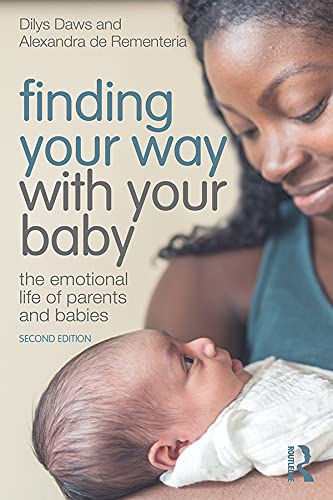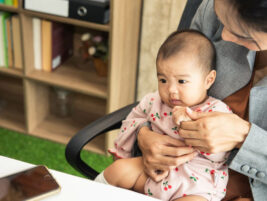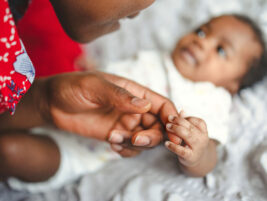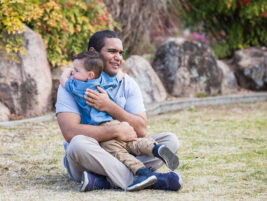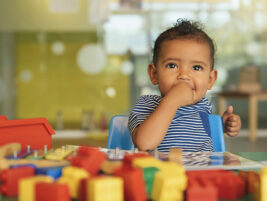Reviewed by Lauren Keegan (Australia)
In becoming a parent, your life will never be the same again.
This is where the second edition of Finding your way with your baby: The emotional life of parents and babies, begins. It’s a clever starting point as it immediately sets it apart from the masses of parenting books on the market. It acknowledges that new and expectant parents are in a transitional phase of life and so must not only prepare for having a baby but for becoming a parent, too.
Authors Dilys Daws and Alexandra de Rementeria have a wealth of clinical experience in child and adolescent psychotherapy; their gentle guidance in reflective parenting does not go unnoticed in this book.
Dilys Daws credits the work of her co-author Alexandra de Rementeria, in the second edition, in addressing issues of diversity, an issue that was under-addressed in the first issue which Dilys acknowledges was “too white and too straight.” This edition reflects diversity in parenting and includes the voices of diverse backgrounds and same-sex parents.
The book is structured in a way that it can be read chronologically, or parents can simply dip in and out of it as needed. It is divided into three parts: becoming a parent, being with your baby and, the wider world.
While it does gently suggest ways in which parents and babies can get to know each other, it is far from a “how-to” parenting book. Rather, it weaves lessons from perinatal and infant mental health research and practice to normalise parents’ experiences and encourage reflection so that parents can come up with solutions to their problems. I love this because it’s how I approach my therapeutic practice in working with perinatal populations.
Parenting books often take the “expert” stand in what parents should and shouldn’t do. Some aspects of this approach are helpful for parents and can guide them in ways to care for their baby. However, it is not helpful in the sense that parents learn to rely on external parenting strategies rather than developing their instincts and wisdom which comes from, over time, getting to know their unique baby.
I was pleasantly surprised to see the inclusion of neurobiological research and how women’s brains change when they have a baby. The word to describe this, matrescence, is akin to adolescence and marks the immense hormonal, psychological, physiological, and emotional changes that women undergo from conception through to the postpartum years. I speak about this often to parents in my practice, to validate the unsettling nature of becoming a new person, someone different to who they were before they had children. While it is something some women may resist (letting go of their former selves), it can also empower them to forge a new path ahead, building on the strengths they have discovered in themselves as parents.
There is an entire chapter dedicated to the emotional experience of fathers too and the complexities in the couple’s relationship upon the arrival of a baby. The authors help fathers understand what is happening to their infants, their partners, and themselves. I particularly enjoyed reading about the addition of neurobiological research related to fathers.
What this book does especially well is to highlight the importance of the relationship between parent and baby. It gently encourages parents to reflect on the ways they interact with their babies without shame or judgment. The authors examine common parenting challenges such as sleep, settling, and feeding from a relational perspective.
For example, the authors do not tell parents how to get their baby to sleep, instead asking parents to reflect on sleep in a relational context, especially related to experiences of separation and loss, in the present and often in the parent’s past. If infant sleep difficulties are present, this could be linked back to unresolved loss in the parent’s infancy or early childhood, and now impacting how they feel about their baby going to sleep in the present.
The authors provide insight into “typical” parenting challenges from sleep and settling to breastfeeding and weaning and returning to work, and where these challenges may benefit from professional intervention. Parenting difficulties are normalised and validated. In addition to this, ambivalent feelings held by parents toward their infants are also normalised, and echo the words of Winnicott, about the good enough mother.
Finding your way with your baby: The emotional life of parents and babies, will be of particular use to perinatal and infant mental health practitioners, as well as for new and expectant parents.
I will note, however, that while the book is not a textbook per se, it is aimed at readers of an advanced literacy level, so this is something to think about when recommending it as a parenting resource.
The book concludes with a lovely message to parents, which I will share with you here:
We have also tried to show how much you can learn from observing your baby – it releases your instincts, which we have encouraged you to trust. We hope we have also made it clear that you only have to be a ‘good-enough’ parent. (Daws & de Rementeria, 2021)
Reference
Daws, D., & de Rementeria, A. (2021). Finding Your Way with Your Baby: The Emotional Life of Parents and Babies (2nd ed.). Routledge. https://doi.org/10.4324/9781003081623
Authors
Lauren Keegan (Australia)


